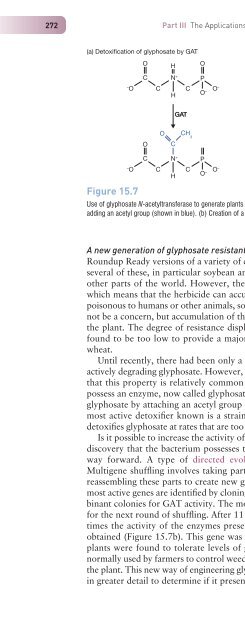Gene Cloning and DNA Analysis: An Introduction, Sixth Edition ...
Gene Cloning and DNA Analysis: An Introduction, Sixth Edition ...
Gene Cloning and DNA Analysis: An Introduction, Sixth Edition ...
Create successful ePaper yourself
Turn your PDF publications into a flip-book with our unique Google optimized e-Paper software.
272<br />
(a) Detoxification of glyphosate by GAT<br />
Figure 15.7<br />
O H O<br />
C<br />
– –<br />
O C C O<br />
H<br />
O –<br />
O<br />
C<br />
O<br />
Part III The Applications of <strong>Gene</strong> <strong>Cloning</strong> <strong>and</strong> <strong>DNA</strong> <strong><strong>An</strong>alysis</strong> in Biotechnology<br />
N +<br />
GAT<br />
C<br />
N +<br />
CH 3<br />
– –<br />
O C C O<br />
H<br />
O –<br />
P<br />
P<br />
(b) Directed evolution to produce a highly active GAT enzyme<br />
11 rounds of<br />
multigene shuffling<br />
New GAT gene<br />
Enzyme is 10 000<br />
times more active<br />
Use of glyphosate N-acetyltransferase to generate plants that detoxify glyphosate. (a) GAT detoxifies glyphosate by<br />
adding an acetyl group (shown in blue). (b) Creation of a highly active GAT enzyme by multigene shuffling.<br />
3 native<br />
GAT genes<br />
A new generation of glyphosate resistant crops<br />
Roundup Ready versions of a variety of crops have been produced in recent years, <strong>and</strong><br />
several of these, in particular soybean <strong>and</strong> maize, are grown routinely in the USA <strong>and</strong><br />
other parts of the world. However, these plants do not actually destroy glyphosate,<br />
which means that the herbicide can accumulate in the plant tissues. Glyphosate is not<br />
poisonous to humans or other animals, so the use of such plants as food or forage should<br />
not be a concern, but accumulation of the herbicide can interfere with reproduction of<br />
the plant. The degree of resistance displayed by Roundup Ready crops has also been<br />
found to be too low to provide a major economic benefit with some crops, notably<br />
wheat.<br />
Until recently, there had been only a few scattered reports of organisms capable of<br />
actively degrading glyphosate. However, searches of microbial collections have revealed<br />
that this property is relatively common among bacteria of the genus Bacillus, which<br />
possess an enzyme, now called glyphosate N-acetyltransferase (GAT), which detoxifies<br />
glyphosate by attaching an acetyl group to the herbicide molecule (Figure 15.7a). The<br />
most active detoxifier known is a strain of B. licheniformis, but even this bacterium<br />
detoxifies glyphosate at rates that are too low to be of value if transferred to a GM crop.<br />
Is it possible to increase the activity of the GAT synthesized by B. licheniformis? The<br />
discovery that the bacterium possesses three related genes for this enzyme pointed a<br />
way forward. A type of directed evolution called multigene shuffling was used.<br />
Multigene shuffling involves taking parts of each member of a multigene family <strong>and</strong><br />
reassembling these parts to create new gene variants. At each stage of the process, the<br />
most active genes are identified by cloning all variants in E. coli <strong>and</strong> assaying the recombinant<br />
colonies for GAT activity. The most active genes are then used as the substrates<br />
for the next round of shuffling. After 11 rounds, a gene specifying a GAT with 10,000<br />
times the activity of the enzymes present in the original B. licheniformis strain was<br />
obtained (Figure 15.7b). This gene was introduced into maize, <strong>and</strong> the resulting GM<br />
plants were found to tolerate levels of glyphosate six times higher than the amount<br />
normally used by farmers to control weeds, without any reduction in the productivity of<br />
the plant. This new way of engineering glyphosate resistance is currently being examined<br />
in greater detail to determine if it presents a real alternative to Roundup Ready crops.


